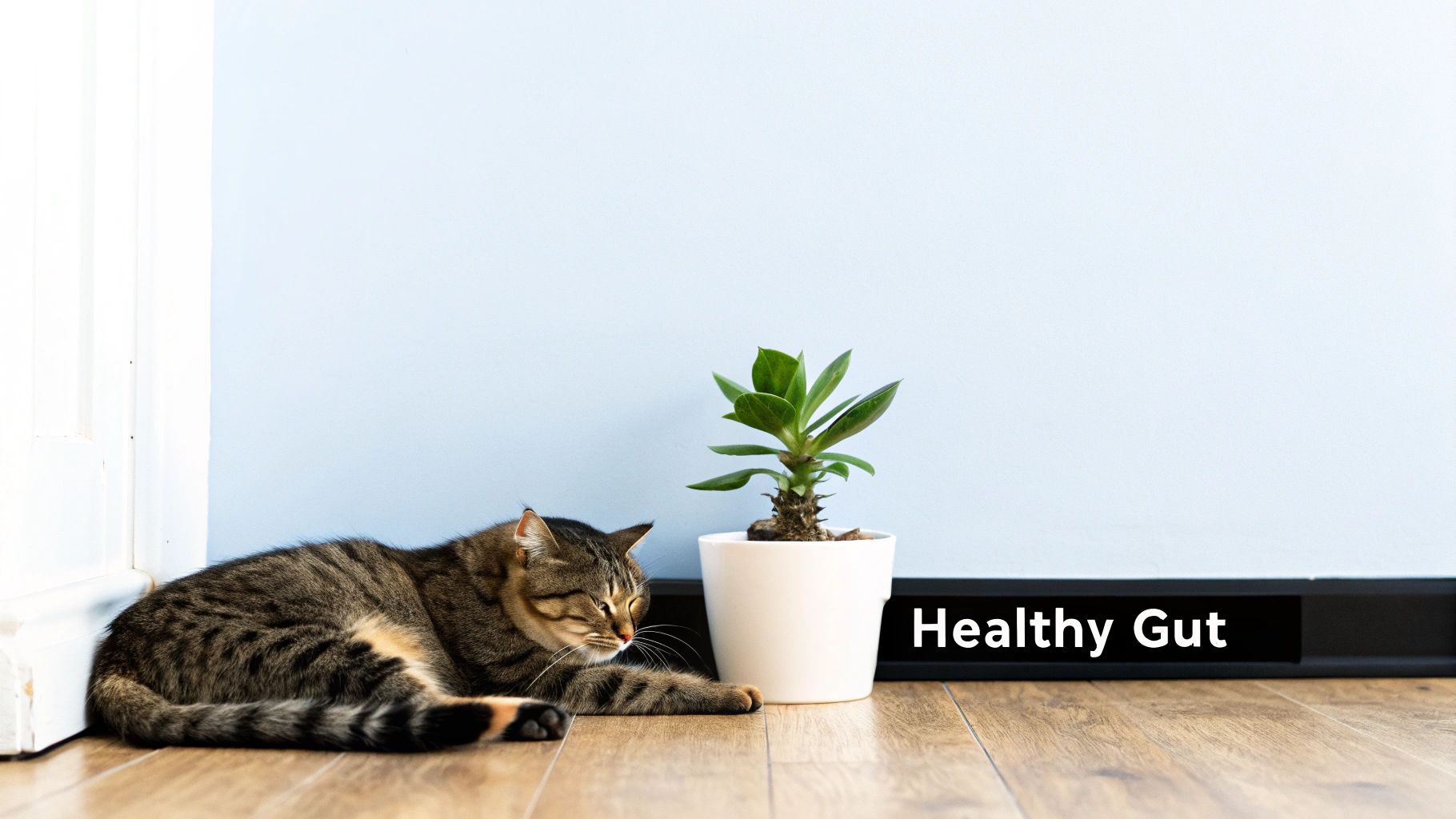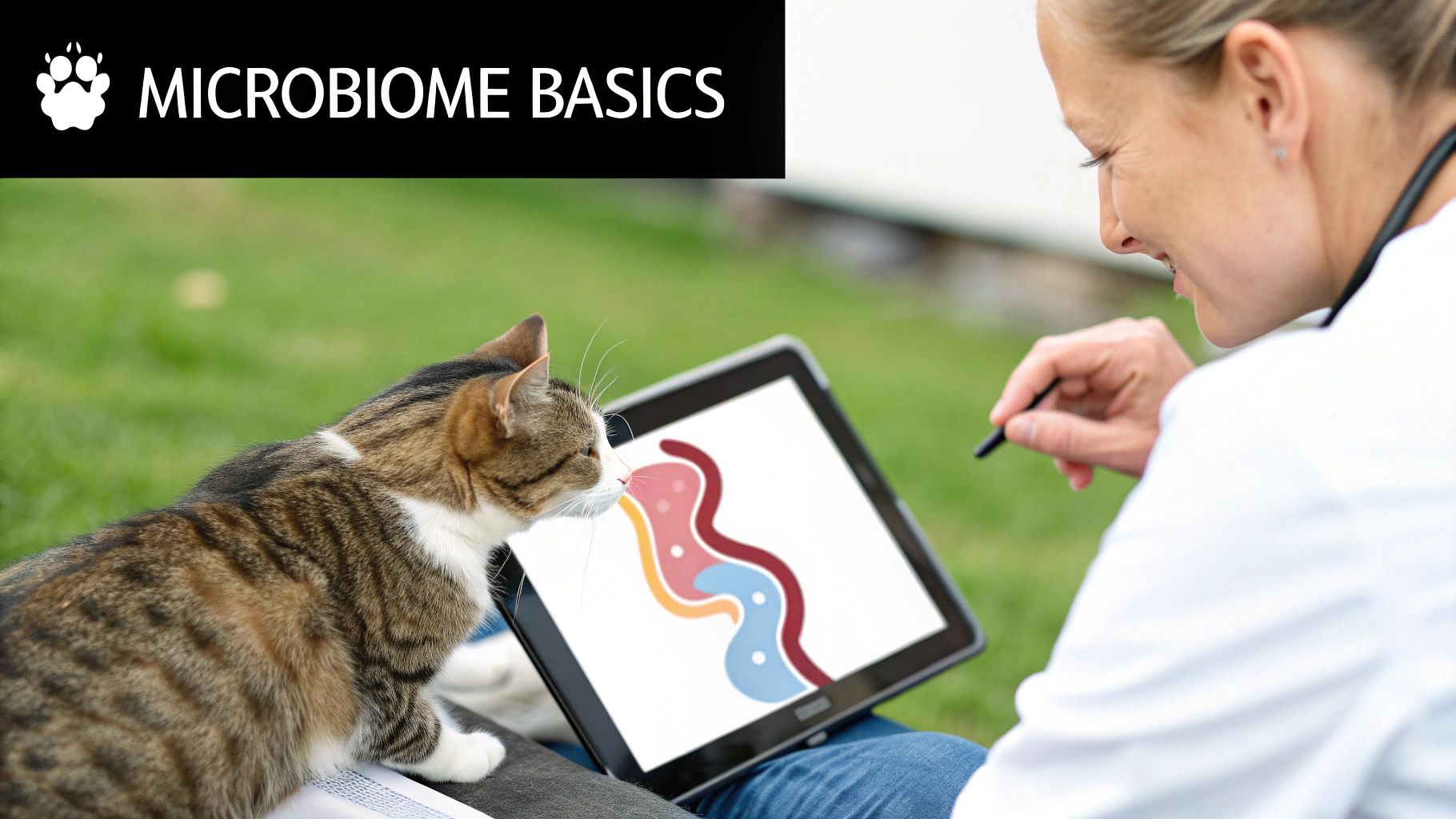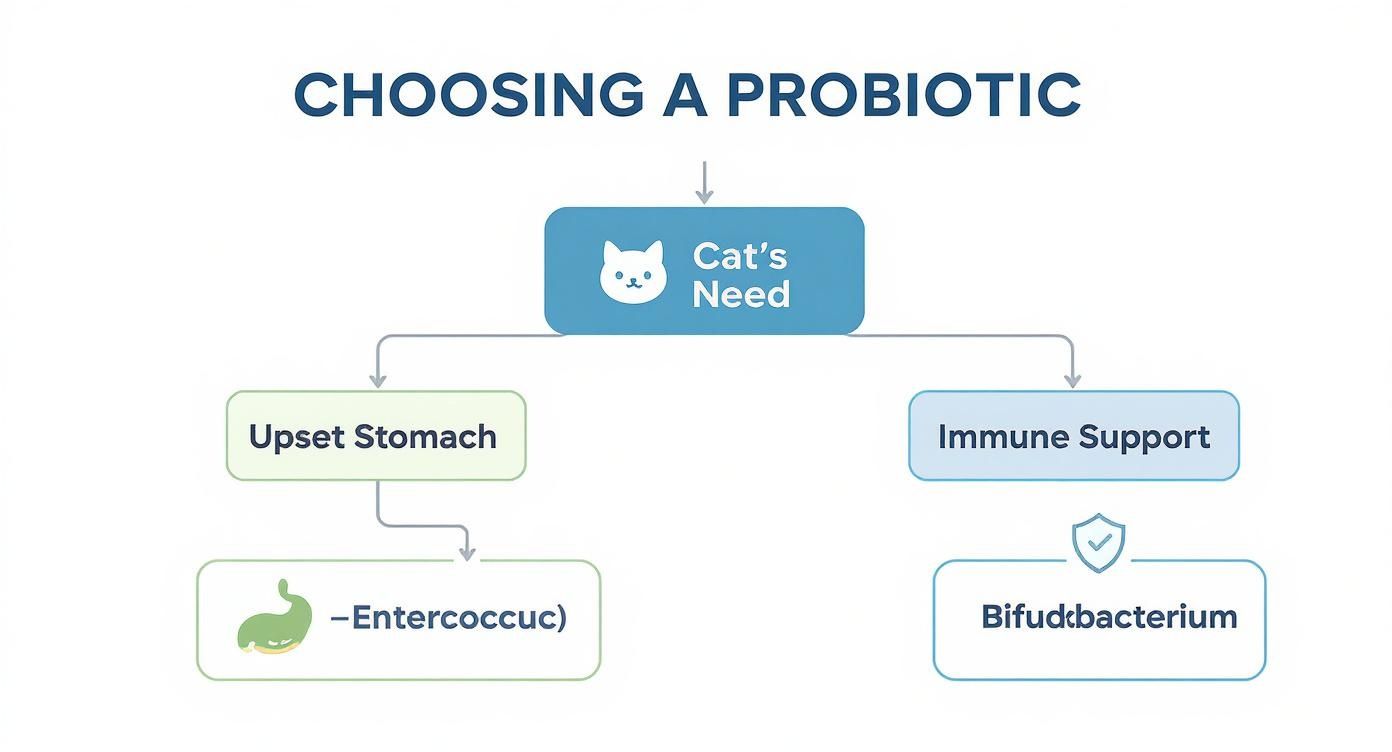
Best Probiotics for Cats Ultimate Guide
When it comes to finding the best probiotics for your cat, you’ll want to look for formulas made specifically for felines. That means seeing strains like Enterococcus faecium and Bifidobacterium animalis on the label, as these are clinically shown to support a cat’s unique digestive system. Always check for a clear CFU (Colony Forming Unit) count and steer clear of products loaded with unnecessary additives—this ensures you’re giving your cat a pure, potent supplement.
Why Your Cat Might Need a Probiotic

You want what's best for your cat, and you've probably heard the buzz about probiotics being a game-changer for their health. But what does that really mean in practical terms?
Think of your cat's gut as a bustling, microscopic garden. Probiotics are like the beneficial seeds you plant to help that garden flourish, keeping harmful weeds (or "bad" bacteria) from taking over. This isn't just about dealing with the occasional upset tummy; a balanced gut is the very foundation of a healthy, happy cat.
When the bad bacteria start to outnumber the good, you'll often see the fallout in the litter box—or on the carpet. Telltale signs like diarrhea, vomiting, or smelly gas are often the first clues that their internal ecosystem is out of whack. Probiotics step in to help restore that crucial balance.
The Growing Focus on Feline Gut Health
More and more, cat owners are realizing just how deeply connected gut health is to their pet's overall well-being. This isn't just a hunch; it's a trend reflected in the market. The U.S. cat probiotics market was valued at USD 59.32 million and is expected to more than double by 2033. This boom is fueled by a growing understanding of feline health and a proactive approach to pet care.
A healthy gut is home to as much as 70-80% of your cat's immune system. By supporting their digestive tract with the best probiotics for cats, you are directly reinforcing their body's natural defenses against illness.
Key Benefits of Probiotics for Your Cat
Adding a good probiotic to your cat's daily routine can bring about some pretty noticeable improvements that go far beyond just digestion.
- Better Digestion: Probiotics help your cat break down their food more efficiently. This means they absorb more nutrients, leading to firmer, more regular stools.
- A Stronger Immune System: With so much of the immune system housed in the gut, a balanced microbiome helps regulate its response, which can even reduce the severity of allergies.
- Less Stress-Related Tummy Trouble: A trip to the vet, a new pet in the house, or even just a change in routine can cause digestive upset. Probiotics can help soothe their gut during these stressful times.
- Support After Antibiotics: Antibiotics are great at killing harmful bacteria, but they often wipe out the good guys, too. Probiotics are essential for helping replenish that beneficial gut flora and getting things back to normal faster.
For cats who seem to have a perpetually sensitive stomach, combining probiotics with the right diet is key. If this sounds like your feline friend, our guide on the best cat food for sensitive stomach offers even more tips to help you find a solution that works.
Understanding Your Cat's Gut Microbiome

Before we can talk about probiotics, we need to zoom in on your cat’s digestive system. Think of your cat's gut as a bustling, microscopic city—a complex ecosystem known as the gut microbiome. This inner world is packed with trillions of microorganisms, mostly bacteria, that are absolutely essential for your cat’s health.
This isn’t just about breaking down food. This microbial city is the headquarters for your cat's overall well-being. A healthy gut is dominated by beneficial bacteria, the "good citizens," who work tirelessly to digest food, create vital nutrients, and fortify the gut wall against harmful invaders.
It's amazing to think about, but a staggering 70-80% of your cat's immune system actually resides in their gut. This means that a well-balanced microbiome is their single most important line of defense.
When the Internal City Is in Chaos
Problems arise when this delicate balance gets thrown off, a condition called dysbiosis. It doesn't take much to cause an upset. A stressful move to a new home, a round of antibiotics that kills both good and bad bacteria, or a simple change in diet can all disrupt the peace.
When that happens, the troublemakers—the pathogenic "bad" bacteria—seize the opportunity to multiply and take over. The effects of this internal chaos often become very obvious.
- Digestive Upset: Diarrhea, constipation, vomiting, and smelly gas are the most common signs that the bad guys are winning.
- Weakened Immunity: With the gut out of balance, your cat's immune response can weaken, leaving them vulnerable to more infections and even allergies.
- Poor Nutrient Absorption: Without enough good bacteria on the job, your cat can't properly absorb nutrients from their food. This can lead to issues like weight loss or a dull, flaky coat.
This is where probiotics come in. Think of them as reinforcements arriving to help the good citizens restore order. They don't just add more good guys; they help shift the entire environment back in favor of the beneficial microbes, allowing them to out-compete the harmful ones.
The goal of using the best probiotics for cats is to re-establish this healthy balance. By supporting the beneficial bacteria, you are directly reinforcing the gut lining, improving digestion, and bolstering their natural immune defenses.
Exploring the Microbial World
The world inside your cat's gut is incredibly complex, with different bacterial species all performing unique jobs that contribute to the whole ecosystem. Scientists can now use advanced techniques to explore metagenomics and microbial communities, giving us a fascinating look at just how diverse and functional this internal world is.
This complexity is why a high-quality, multi-strain probiotic is often the way to go. It delivers a diverse team of beneficial bacteria to tackle different issues and support the entire system. Once you understand this internal city, you can see how the best probiotics for cats are more than just a quick fix for an upset tummy—they're powerful tools for building long-term health from the inside out.
How to Read a Probiotic Label
Walking down the pet supplement aisle, it's easy to feel overwhelmed by the sheer number of probiotic options. So, how do you pick the right one? The secret isn't in the flashy packaging—it's in the fine print on the label. Once you know what to look for, you can cut through the noise and find a product that will actually make a difference for your cat.
Think of the label as a team roster for your cat’s gut. You don’t just want to know that "players" are on the team; you want to know who the star players are. A high-quality probiotic will always list the specific strains it contains, giving you a clear picture of its game plan.
Identifying the Hero Strains
Not all beneficial bacteria are created equal. Different strains have different jobs, and a reputable product will be completely transparent about what’s inside. This tells you exactly what kind of support your cat is getting.
When it comes to cats, some strains have more research backing them than others. Two of the most effective are:
- Enterococcus faecium: A real powerhouse for maintaining intestinal balance and a go-to for managing bouts of diarrhea.
- Bifidobacterium animalis: Known for its ability to support a robust immune response and promote overall gut health.
Seeing these specific names on an ingredient list is a fantastic sign. It shows the manufacturer built their formula on science, not just guesswork. This level of detail is a key differentiator between a great product and a mediocre one, and it's a concept that applies across species. Understanding the right strains is just as crucial when looking for the best probiotics for dogs.
To help you get even more familiar with the key players, here’s a quick breakdown of common strains and what they do.
Common Probiotic Strains and Their Functions
| Probiotic Strain | Primary Benefit | Commonly Used For |
|---|---|---|
| Bifidobacterium animalis | Supports immune function | General wellness, immune system support |
| Enterococcus faecium | Balances gut bacteria | Diarrhea, stress-related digestive upset |
| Lactobacillus acidophilus | Aids in nutrient absorption | Digestive efficiency, post-antibiotic recovery |
| Bifidobacterium bifidum | Helps control harmful bacteria | Maintaining a healthy gut environment |
| Lactobacillus casei | Supports inflammatory response | Chronic GI issues, overall gut stability |
| Bacillus coagulans | Spore-forming and very stable | Inconsistent stool, improving digestion |
Knowing these names helps you match a product to your cat's specific health needs, whether you're looking for general maintenance or targeted support.
Understanding CFUs and Potency
Next up, you'll see a number followed by "CFU," which stands for Colony Forming Units. This tells you how many live, active bacteria are in each dose. Essentially, it’s a measure of the supplement's strength.
It’s tempting to think that a bigger number is always better, but that’s not quite right. The goal is to have the right amount of the right strains. An excessively high CFU count can sometimes cause a little digestive upset, while a number that's too low simply won't be effective.
For most cats, a daily probiotic with a CFU count between 1 and 5 billion is the sweet spot for general wellness. This range is potent enough to make a difference without overwhelming their system.
The product's format matters, too. While powders and chews are common, liquid probiotics are becoming more popular, especially for picky eaters. New shelf-stable formulas have made them even more convenient, as they can protect the bacteria's viability without needing to be refrigerated. This is a growing trend, and you can explore the pet probiotics market report to see how these innovations are changing the game.
The Importance of Prebiotics
Finally, do a quick scan of the label for one more crucial ingredient: prebiotics.
If probiotics are the good seeds you’re planting in your cat's gut garden, think of prebiotics as the fertilizer. They’re a special type of fiber that feeds the good bacteria, helping them multiply and establish a healthy colony.
Look for ingredients like:
- Fructooligosaccharides (FOS)
- Inulin
- Larch Arabinogalactan
Finding prebiotics on the label is the mark of a well-designed product. It shows the company understands that true gut health is about creating a thriving ecosystem, not just temporarily adding more bacteria. By checking for specific strains, the right CFU count, and the presence of prebiotics, you can read any label with confidence and choose the very best for your cat.
Finding the Right Probiotic Format
You’ve learned how to read the label and spot the good stuff in a probiotic supplement. Great. But now comes the real-world test: actually getting it into your cat. The most powerful probiotic on the planet is useless if your cat turns up their nose at it.
The format you choose—powder, chew, or liquid—can be the difference between a simple daily habit and a daily wrestling match. It's less about which one is scientifically "superior" and all about what works for your cat and your routine.
Powders: The Go-To for Picky Eaters
For many cat owners, especially those with discerning felines, powders are a lifesaver. A good probiotic powder is virtually tasteless and odorless, which means you can mix it right into their wet food without them ever being the wiser.
This format is incredibly flexible. You can easily adjust the dose up or down, and because it disappears into a meal, it’s perfect for cats who are suspicious of anything new. It's a simple, drama-free way to support their gut health.
Pro Tip: If you mainly feed dry kibble, no problem. Just add a splash of water or some low-sodium bone broth to the food first. This gives the powder something to stick to, ensuring your cat gets the full dose in every bite.
Chews: The Convenient Treat
If your cat is food-motivated and loves a good treat, probiotic chews can be a fantastic, hassle-free option. They’re designed to be delicious, turning supplement time into a fun part of their day. There's no measuring or mixing, which is a big win for busy owners.
A word of caution, though: you have to read the ingredient list carefully. Look for chews made with high-quality ingredients and steer clear of those packed with artificial flavors, unnecessary fillers, or sugar. Convenience is great, but not if it comes at the cost of quality.
Liquids: The Targeted Approach
Liquid probiotics are another excellent way to deliver those good bacteria, especially for cats who might be wary of both powders and chews. A few drops can be easily mixed into their water or wet food.
Some liquid formulas even come with a dropper for direct application into their mouth. This method gives you total control, ensuring your cat gets the exact dose every single time. It's particularly useful if your vet has recommended a specific amount to address a particular health concern. As with chews, just double-check that the formula is clean and free of unwanted additives.
This decision tree can help you visualize which probiotic strains might be best for your cat's specific needs.

This simple guide points you toward strains like Enterococcus for digestive troubles or Bifidobacterium for immune support, helping you match the product to your goals.
At the end of the day, consistency is what gets results. Whether you pick a powder for your fussy eater, a chew for your treat-lover, or a liquid for precise dosing, the best format is simply the one you can give your cat reliably, every single day.
How to Spot a High-Quality Probiotic Brand
Trying to pick a good cat supplement can feel a bit like throwing a dart in the dark. But when it comes to probiotics, you can learn to spot the good ones once you know what to look for. The market is flooded with options, so it's more important than ever to see past slick marketing and find products with real substance.
A brand you can trust will always put safety, transparency, and science ahead of flashy promises. Instead of talking about miracle cures, they'll be focused on their manufacturing quality and providing clear, honest labels. This is what helps you make a truly informed choice for your cat.
It’s no surprise that feline gut health is getting so much attention. The global market for cat probiotics is already valued at around USD 602 million and is set to keep growing. You can discover more insights about the cat probiotics market to get a feel for the trends behind this boom.
Look for the NASC Quality Seal
One of the best shortcuts to finding a reputable brand is to look for the National Animal Supplement Council (NASC) Quality Seal. Think of it as a stamp of approval from an industry watchdog dedicated to keeping pets safe.
To get this seal, a company has to go through a tough third-party audit. This isn't just a paperwork check; it's a deep dive into their manufacturing, labeling, and how they handle any reports of problems.
Seeing the NASC seal on a product tells you the manufacturer is serious about quality, vigilance, and continuous improvement. It’s a quick way to identify brands that value safety and transparency, giving you some much-needed peace of mind.
This certification is your assurance that what’s on the label is actually in the bottle—a critical detail when you’re trying to find a supplement that will genuinely help your cat.
Scrutinize Brand Transparency and Claims
A high-quality brand has nothing to hide. They should be more than willing to share information about where they source their ingredients, their manufacturing methods, and the specific probiotic strains in their formula. If you find vague descriptions or a total lack of detail, that's a major red flag.
Be skeptical of brands that make dramatic or unsupported medical claims. Remember, probiotics are supplements, not drugs. Their job is to support your cat's health, not to "cure" diseases. A legitimate company will use responsible language, focusing on things like supporting digestive balance or promoting a healthy immune system.
Here are a few other things to keep an eye out for:
- Third-Party Testing: The best brands often send their products to independent labs to double-check their potency and purity. They'll be proud to share those results with you.
- Clear Contact Information: A company that stands by its product makes it easy for you to get in touch with questions or concerns.
- Positive, Realistic Reviews: Look for genuine feedback from other pet owners. The most believable reviews will describe gradual, steady improvements, not overnight miracles.
Choosing a great probiotic is just one piece of the puzzle. If you're looking for more ways to support your cat’s overall health, check out our guide on the best supplements for cats. By arming yourself with this knowledge, you can confidently choose a high-quality probiotic from a brand that truly has your pet's best interests at heart.
Your Top Questions About Cat Probiotics, Answered
Even after you've done your research, a few questions are bound to pop up. It's completely normal. Here, we'll walk through the most common things cat owners ask, giving you clear, straightforward answers so you can feel totally confident about your choice.
Let's dive into the practical side of things, from safety to how long it takes to see a real difference.
Can I Give My Cat Human Probiotics?
This question comes up all the time, and the answer is a hard no. It might seem like a simple solution, but our digestive systems and our cats' are fundamentally different. A cat's gut is shorter, has a different pH level, and is populated by entirely different strains of good bacteria.
Probiotics for people are made for our bodies, with specific bacterial strains and dosages that won't do your cat any good. At best, they'll be ineffective. At worst, they could cause digestive upset or contain ingredients like xylitol, which is highly toxic to pets. Always, always stick to a formula made specifically for cats.
How Long Does It Take for Cat Probiotics to Work?
When starting any new supplement, a little patience goes a long way. The timeline really depends on your cat’s unique health situation and why you’re giving them probiotics to begin with.
For a temporary problem, like diarrhea from the stress of a car ride, you might notice things getting better in just a couple of days. But if you're aiming to tackle a more chronic issue or boost their overall immune system, you'll need to be more patient. It can often take four to six weeks of daily use to see a real shift as their gut microbiome finds a new, healthier balance.
A common pitfall is giving up too early. Building a healthy gut is a marathon, not a sprint. Sticking with it consistently is what creates those lasting, positive changes you're looking for.
Are There Any Side Effects I Should Worry About?
Probiotics are incredibly safe, and side effects are uncommon and usually very mild. When you first introduce them, it's possible for some cats to get a little gassy or bloated. This is just their digestive system getting used to the new influx of good bacteria.
This adjustment phase typically passes quickly. A great way to avoid any discomfort is to start with a smaller dose for the first few days and gradually increase it to the recommended amount. This gives your cat's system a chance to adapt without any drama.
Should My Cat Take Probiotics Every Single Day?
To keep that gut healthy for the long haul, daily use is the way to go. Giving your cat a consistent dose every day helps maintain a strong and stable population of beneficial bacteria. Think of it as tending to their internal garden—a little daily care keeps everything thriving.
This steady support strengthens their digestive and immune systems around the clock. Your vet might recommend a different schedule for a specific reason, like after a round of antibiotics, but for general wellness, daily is best. Just follow the instructions on the package.
And while you're focused on your cat's inner health, why not celebrate your bond in other ways? For truly devoted cat parents, there's a world of sophisticated personalized gifts for cat lovers to explore.
At Joyfull, we create formulas with clean ingredients and high-quality proteins, all scientifically reviewed by our veterinary advisor. Because a healthful life isn’t just for humans—your pets deserve it, too. Learn more about our commitment to pet wellness.

